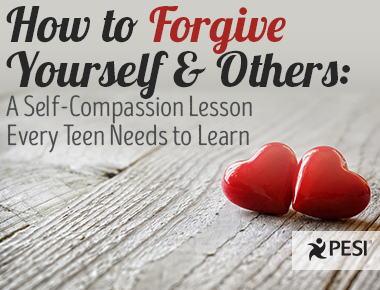How to Forgive Yourself and Others
A Self- Compassion Lesson Every Teen Needs to Learn

A fifteen-year-old young lady, Sara*, came to one of my teen self-compassion workshops. All the teens in the group could tell right away by her body language and facial expressions that she was upset. During our opening share, she described how one of her friends wrote a mean post about her on Instagram. In retaliation, Sara said a rude comment about the girl’s parents’ divorce during lunch at school.
Sara was angry at her friend for the mean social media comment, but was even more mad at herself for deeply hurting her friend in response.
In our group of teens, we practice mindfulness and self-compassion skills to empower and enrich everyone. These skills are particularly helpful for self-forgiveness and forgiveness of others. They also help to heal anger.
The research of Kristin Neff (2009) suggests that self-compassionate people are more apt to forgive the wrongdoings of others. By practicing forgiving yourself it becomes easier to forgive others when anger arises. Forgiveness is one way of being kind, and it benefits the forgiver even more than the forgiven person. When we practice forgiving ourselves and other people, we can let go of some negativity, and instead offer goodness in place of the anger.
Our group of teens explored how sometimes people don’t react well to their own anger, or that of others. We all helped Sara see that she felt vulnerable, hurt, and insulted by her friend’s post. Together, we discovered the need to learn how to forgive others and ourselves. All on her own, Sara decided to apologize to her friend, but most importantly she forgave herself for her reaction.
Our group of teens practiced "We're All in This Together," a card drawn from Self-Compassion and Mindfulness for Teens a card deck based on my book, Self-Compassion for Teens: 129 Activities and Practices to Cultivate Kindness.
“Along with me, ______________ (say the name of the person) wants to be happy and free from suffering.”Together, we silently repeated this line 10x and then discussed it further.
After this practice, Sara’s body and face relaxed. She still needed time before she could overcome her shame, and apologize to her friend. However, she also felt she could better handle these types of situations in the future if she remembers to be mindful, kind, and compassionate towards herself and others.
Self-compassion and mindfulness skills can be adapted to almost any challenging situation teens face. The card deck I created provides over fifty conversation starters and exercises you can use with teens to help build mindful awareness, compassion, empathy, and kindness. Topics such as ADHD, anxiety, depression, LGBTQI issues, academic pressures, anger and body image are all addressed.
Download 5 cards here, including “We’re All in This Together.”
*name changed for confidentiality.
Topic: Self-Compassion
Tags: Mindfulness | Self-Compassion | Self-Empathy | Self-Esteem




